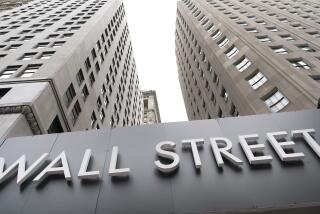S. Korean Stocks Recoup Losses
- Share via
South Korea’s stock market jumped Tuesday to its highest level since October 1996, becoming the first East Asian market to recoup all of the horrendous losses recorded since the Asian economic crisis took root nearly two years ago.
The market’s milestone is another strong sign that the Asian crisis is passing, economists said. That could set the stage for faster growth worldwide this year and next.
South Korea’s benchmark stock index, known as the KOSPI, rose 17.68 points, or 2.3%, to 793.98, eclipsing the high of 792.29 reached June 17, 1997.
That was about two weeks before Thailand devalued its currency, heralding the beginning of East Asia’s downward economic spiral.
Trading volume on the Seoul stock exchange hit a record Tuesday as money poured in from local and foreign buyers, analysts said.
“The money is overflowing in the market,” said broker Choo Hee-up at Dongwon Securities.
The situation has improved so drastically in recent months that Chon Chol-hwan, the country’s central bank chief, was asked Tuesday if he thought the market might be overheating.
“I don’t think the current prices can be considered a bubble,” he said.
Nearly all of Asia’s battered stock markets have staged dramatic rebounds from their bottoms reached late last summer, as investors have grown increasingly optimistic that the worst of the region’s woes are behind it.
Although most East Asian economies are still in recession, the currencies have been relatively stable over the last six months, interest rates have declined, and there are more signs of a pickup in consumer and business spending.
Measured in native currency terms, the Korean stock market has gained 39% so far this year, the Malaysian market is up 14%, the Hong Kong market has soared 33% and the Singapore market is up 35%.
The U.S. Dow Jones industrial average is up 18% during the same period.
Still, other than South Korea’s market, none of the Asian markets has yet recovered all of the losses suffered in the wake of the economic collapse. The Hong Kong market, for example, still is down 20% from its record high reached in August 1997.
Even the South Korean market index is still off 30% from its record high, which was reached in 1994.
And measured in dollar terms, most Asian markets’ losses are still enormous because of the effects of the currency devaluations.
The International Monetary Fund, World Bank and governments of industrialized nations have financed loan packages totaling $189 billion in the last 20 months to rescue Thailand, Indonesia, South Korea, Russia and Brazil as their economies have stumbled under heavy debt loads and mismanagement.
That support has given the countries breathing room as they have implemented free-market reforms and reduced budget and trade deficits.
In Washington on Tuesday, the United States stepped up pressure on Europe and Japan to do more to ensure the recovery of emerging markets and the global economy overall.
“Despite positive developments in the world economy in recent months, this is not the moment to be complacent,” Treasury Secretary Robert E. Rubin told the IMF’s interim committee, an advisory panel.
Rubin, repeating a demand that has resonated this week during a meeting of the world’s central bankers and finance ministers, said the U.S. has borne the burden of providing depressed emerging-market economies an export outlet for too long--resulting in a huge U.S. trade deficit.
“This situation cannot continue indefinitely. Japan and Europe must boost demand-led growth,” he said. “The pursuit of policies to promote more balanced growth in key economies is the most important and appropriate step to take to help avoid excess volatility and significant misalignments” in foreign currency values.
Officials close to Japanese Prime Minister Keizo Obuchi said Friday that he will unveil economic stimulus measures when he meets with President Clinton in Washington on Monday, and U.S. officials are expecting that, at minimum, Obuchi will propose extending the current government spending program, set to expire in September.
Hope for a recovery in Japan’s beleaguered economy has been one of the key forces driving Asian stocks higher this year.
*
Bloomberg News and Reuters were used in compiling this report.
* BANKER’S VIEW: U.S. official still cautious. C2
* WALL STREET: Dow nears 11,000 level. C4
(BEGIN TEXT OF INFOBOX / INFOGRAPHIC)
Rebound in Seoul
The South Korean stock market’s main index, the composite, has rocketed in recent months, and on Tuesday it recouped the last of the decline that began in mid-1997. Monthly closes and latest for the index:
Tuesday: 793.98
Source: Bloomberg News
More to Read
Inside the business of entertainment
The Wide Shot brings you news, analysis and insights on everything from streaming wars to production — and what it all means for the future.
You may occasionally receive promotional content from the Los Angeles Times.










